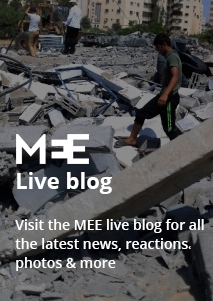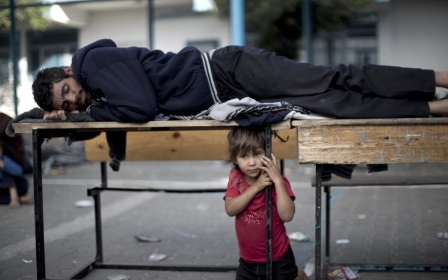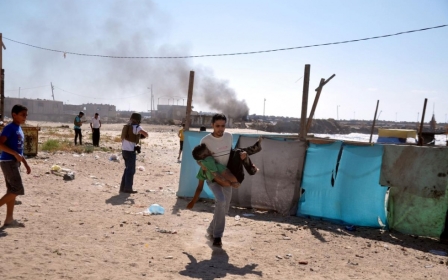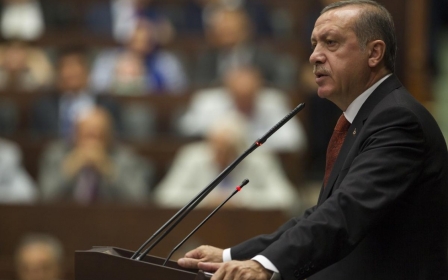Hamas, Israeli officials deny ceasefire reports as brief truce ends
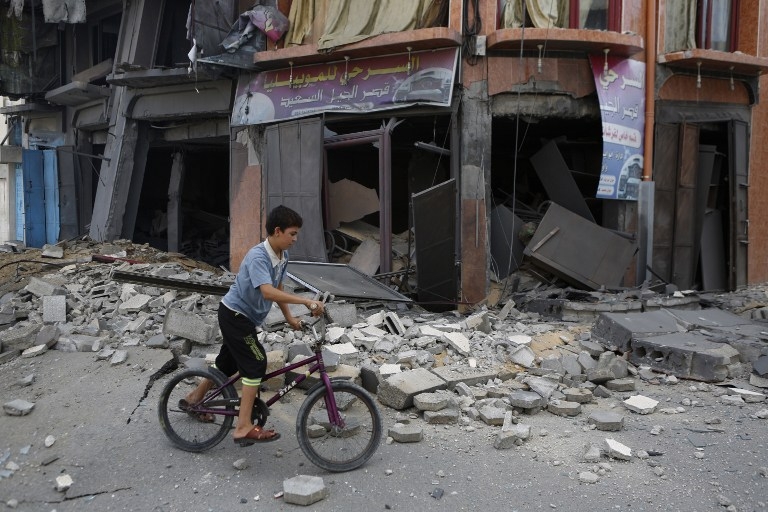
Contrary to a report from an Israeli official, Hamas says efforts are still continuing on a ceasefire agreement between the group and Israel to end the crisis in Gaza, but one has not been agreed.
Talks in Cairo, where Hamas and Israeli delegations are reportedly staying in the hotel, follow several days of diplomatic shuttling between the two sides and Egyptian, Turkish, Qatari and US interlocutors.
Palestinian President Mahmoud Abbas and Egyptian President Abdel Fattah al-Sisi had been scheduled to meet Thursday amid intensifying diplomatic efforts to end the deadly Israeli military offensive on Gaza.
The meeting, announced by Egypt's presidency, comes as Israel and Hamas had agreed to briefly halt to hostilities Thursday on humanitarian grounds.
The five-hour ceasefire began at 10:00am (0700 GMT), but the halt was reportedly disturbed around 12:00pm (0900 GMT) when rockets were fired at southern Israel from Gaza.
In brief hours of calm on Thursday, hundreds of Palestinian Authority employees and customers headed to banks in Gaza, closed during the 10 day crisis and shuttered shops reopened to increased vehicle and foot traffic in the streets. Humanitarian aid organistions also reported that they were at the Gaza's borders ready to receive critical supplies for hospitals and families.
With the short ceasefire in Gaza, talks continued in Egypt with Hamas planning to present a position paper outlining the group's terms for a ceasefire, Haaretz reports.
Central to Hamas paper are reportedly five demands: the opening of all crossings between Israel and the Gaza Strip, 24-hour opening of the Rafah crossing with an international guarantee that it will not be closed; naval access in Gaza; permission for Gaza residents to pray at Al-Aqsa Mosque in Jerusalem; release of prisoners freed in the Gilad Shalit swap and then re-arrested during Israel's operation to find the bodies of three kidnapped and murdered Israeli teenagers; and improved conditions for Palestinian prisoners in Israeli jails.
An Israeli delegation, including Israeli Prime Minister Benjamin Netanyahu and headed by Shin Bet Chief Yoram Cohen, left for Cairo late Wednesday ahead of meetings with senior Egyptian intelligence officials on Thursday, Haaretz reported.
Hamas rejected the last Egyptian-brokered deal saying that it had been excluded from discussions of the ceasefire and would not stop fighting until terms for a ceasefire had been agreed.
Israel initially accepted the proposal before making a u-turn and resuming its bombing campaign, citing the failure of Hamas and Islamic Jihad to accept to the initiative.
A senior Hamas figure over the weekend told Middle East Eye that the group no longer considered Egypt and honest broker in a peace deal and that it would only negotiate a truce through Qatar or Turkey.
On Wednesday, however, several leading Hamas figures met with officials in Cairo, where they called on the original Egyptian proposal to be altered, a Palestinian official said.
Hamas deputy leader Mussa Abu Marzuq set out the desired changes during the talks according to Azzam al-Ahmad, a senior figure in Palestinian president Mahmud Abbas's Fatah movement.
"Hamas has rejected the proposal in its current form and demanded additions, like applying the 2012 agreement concerning border crossings with Israel, and demanded right for fishing up to 12 miles [21 km] into the sea," Ahmad told reporters in Cairo.
Senior Hamas official Ghazi Hamad also told AFP in Gaza City that the Egyptian plan was rejected "in its current form" and that Hamas had notified Egypt of the changes it was seeking.
"The initiative should include clear wording on fully lifting the blockade on Gaza, including opening all the crossings and releasing the rearrested prisoners from the [Gilad] Shalit deal in the West Bank," Hamad said.
He was referring to a 2011 deal under which Shalit, an Israeli soldier held by Gaza fighters for more than five years, was freed in exchange for scores of Palestinian prisoners.
Abbas joins truce efforts
Abbas was also in Cairo today for talks as he continued his bid to find a diplomatic solution to the crisis.
Abbas held talks with Hamas figures, including Marzuq and was due to meet Egyptian Foreign Minister Sameh Shoukri and Arab League chief Nabil al-Arabi later, Fatah’s Ahmad said. Abbas is now scheduled to meet with Sisi on Thursday.
Sisi and Abbas have both been criticised for not doing enough to end the crisis, with Hamas also lashing out at other Arab governments for not doing enough to support Gaza.
"We were let down by the Arab regimes and the closure of the Rafah crossing [with Egypt]," he said, going on to call for an immediate opening of the terminal.
Since last summer's ouster of Mohamed Morsi – the country's first freely elected president – Egypt has kept the Rafah border crossing largely closed.
The international community has largely lent its support to the original plan, with US Secretary of State John Kerry on Tuesday slamming Hamas for “so brazenly firing rockets in the face of a goodwill effort to offer a ceasefire".
The Quartet’s Middle East peace envoy Tony Blair has also striven to push through the original deal.
Blair is back in Cairo, where he is reported to have met with Sisi and Shoukri to discuss Gaza. Egypt's initiative was designed "to allow all the issues that are at the heart of this problem ... to be dealt with in a thorough and proper way," Blair said in a statement.
"The purpose of this initiative is to allow people to come and discuss those issues, but in the meantime for the violence to stop and for the lives of the innocent to be saved," Blair said at a joint news conference with Shoukri.
Blair’s visit, the second in one week, has become broiled in controversy after news site Arabi 21 published a story claiming that Blair was pushing through the Egypt deal, in an attempt to block a rival Qatari initiative which sought better conditions for Gaza.
Citing unnamed sources, the website said that Qatar had already been communicating with the parties concerned, with the knowledge of the United States, before the Egyptian proposal was announced to the media.
The sources said the initiative was essentially the brainchild of Blair, who wanted the ceasefire conditions to be more favourable to Israel.
Further controversy was poured on Blair’s visit when weekly Arab American newspaper Watan, published a report alleging that former Palestinian security chief Mohammed Dahlan had also visited Cairo to meet with Sisi in a bid to further alienate Hamas, which Egypt has branded a terrorist organisation.
The paper's sources said that Dahlan's visit was sponsored by the UAE, where he serves as an advisor for security affairs to Mohammed bin Zayed bin Sultan al-Nahya, the crown prince of Abu Dhabi.
The website Albawaba news had also reported that Dahlan was in Cairo, allegedly to visit the handful of Palestinians who had been wounded in the Israeli air raids and had managed to secure a transferred to Egypt for treatment.
Dahlan fled Gaza in 2007 after an alleged plot to overthrow the new Hamas leadership was discovered. He has since also been accused of trying to overthrow Abbas and in 2011 was expelled from the Fatah movement and forced into exile in the UAE and Egypt.
Israel's second attempted incursion into Gaza
Meanwhile, the Ezzedine al-Qassam Brigades, the armed wing of Hamas, has posted a video saying that its fighters on Tuesday night successfully pushed back an attempted Israeli incursion into the Soudaniya area, in north Gaza.
If the report is accurate, it would be the second attempted ground incursion into Gaza by Israeli forces since Operation Protective Edge began on 7 July.
The first Israeli incursion took place on 12 July and resulted in the wounding of four Israeli soldiers.
According to the video, Palestinian intelligence have been tracking the movement of Israeli warships from their bases in Ashdod and Tel Aviv heading towards Gaza since the beginning of the Israeli military offensive.
The Palestinian fighters, the video says, managed to push back the Israeli onslaught in the west of Nawras resort after engaging the Israelis in an exchange of fire from all sides. According to the video, the Israeli troops were forced to retreat to their ships, despite benefitting from Israeli air cover.
Middle East Eye propose une couverture et une analyse indépendantes et incomparables du Moyen-Orient, de l’Afrique du Nord et d’autres régions du monde. Pour en savoir plus sur la reprise de ce contenu et les frais qui s’appliquent, veuillez remplir ce formulaire [en anglais]. Pour en savoir plus sur MEE, cliquez ici [en anglais].


